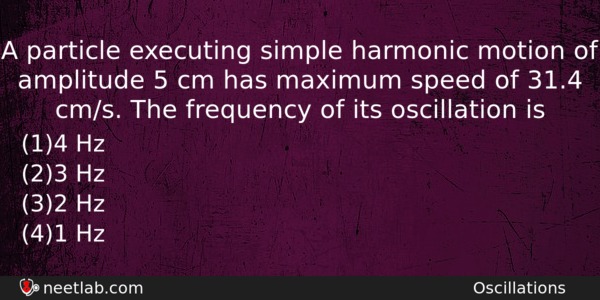| ⇦ | 
| ⇨ |
A particle executing simple harmonic motion of amplitude 5 cm has maximum speed of 31.4 cm/s. The frequency of its oscillation is
Options
(a) 4 Hz
(b) 3 Hz
(c) 2 Hz
(d) 1 Hz
Correct Answer:
1 Hz
Explanation:
a = 5 cm, vₘₐₓ = 31.4 cm/s
vₘₐₓ = ωa ⇒ 31.4 = 2πʋ × 5
⇒ 31.4 = 10 × 31.4 × ʋ
⇒ ʋ = 1 Hz
Related Questions: - A magnifying glass of focal length 5 cm is used to view an object by a person
- A coil has resistance 30 ohm and inductive reactance 20 ohmn at 50 Hz frequency.
- A sphere of 4cm radius is suspended with in a hollow sphere of 6cm radius. If the inner
- A moving coil galvanometer of resistance 100 Ω is converted to ammeter by a resistance
- A boy standing at top of a tower of 20 m height drops a stone
Topics: Oscillations
(58)
Subject: Physics
(2479)
Important MCQs Based on Medical Entrance Examinations To Improve Your NEET Score
- A magnifying glass of focal length 5 cm is used to view an object by a person
- A coil has resistance 30 ohm and inductive reactance 20 ohmn at 50 Hz frequency.
- A sphere of 4cm radius is suspended with in a hollow sphere of 6cm radius. If the inner
- A moving coil galvanometer of resistance 100 Ω is converted to ammeter by a resistance
- A boy standing at top of a tower of 20 m height drops a stone
Topics: Oscillations (58)
Subject: Physics (2479)
Important MCQs Based on Medical Entrance Examinations To Improve Your NEET Score
18000+ students are using NEETLab to improve their score. What about you?
Solve Previous Year MCQs, Mock Tests, Topicwise Practice Tests, Identify Weak Topics, Formula Flash cards and much more is available in NEETLab Android App to improve your NEET score.
Share this page with your friends

Leave a Reply